Blues Reviews
April/May 2018
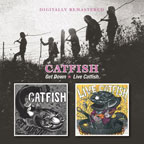 Catfish
Catfish
Get Down/Live Catfish
BGO 2-CD 1308
Blues-rocking musician and gutsy singer Bobby Allen Hodge, known as Catfish
Hodge, was born in 1944 and grew up in Detroit, Michigan, the largest
city on the U.S./Canadian border. Though not as well known as fellow Detroit
rockers Bob Seger, Ted Nugent and Mitch Ryder, Catfish nevertheless was
a local hero and managed to record nearly two dozen albums in his still
ongoing career. The Detroit Free Press once described Hodge as “one
of the great blues guitarists and composers that Michigan ever produced,”
while liners writer John O’Regan saw the band as “the equivalent
of Canned Heat meeting Otis Redding.” In the late 60s, Hodge formed
Catfish and began touring behind these two albums, both released on Epic.
Get Down features nine Hodge originals, including an assertive “The
Hawk,” the dynamic “Love Light,” and a swamp-bluesy
“Rolling & Tumbling”—variant titled “Tradition.”
Two epic numbers are the main course—an eight-minute uproarious
blues heel-kicker about his “300 Pound Fat Mama” and the nine-minute
album closer called “Reprise: Catfish/Get High, Get Naked, Get Down.”
Live Catfish was recorded live at the venerated Eastown Theatre in Detroit
and produced by John Hill—who also plays piano on a soulful cover
of Martha & The Vandellas’ “Nowhere To Run.” In
addition to a very “live” ten-minute version of their signature
“300 Pound Fat Mama,” other Hodge originals are nearly incendiary
(talking about the hard driving “Mississippi River” and the
timely “Letter To Nixon”—probably penned after the war-ending
Tet Offensive) as Hodge also raises the roof on a finger-stabbing cover
of Barrett Strong’s “Money (That’s What I Want)“
and the set-closing, encore recall of Jerry Lee Lewis’ rock and
roller “Whole Lotta Shakin’ Going On”—one of the
best I’ve heard in a long while. I even hear my old pal Wheelchair
Man’s wheels spinning somewhere!—Gary von Tersch
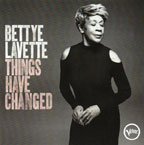 Bettye
LaVette
Bettye
LaVette
Things Have Changed
Verve Records www.vervelabelgroup.com
www.bettyelavette.com
Bettye LaVette has risen to heights and been reborn time and again. From
‘60s R&B hits to Broadway shows, best selling author of “A
Woman Like Me” and her current comeback as Soul Diva and re-interpreter
of classic songs. With her newest CD, “Things Have Changed,”
she’s taken on the songbook of Bob Dylan, giving each song her own
take and digging deep into Dylan’s decades of compositions. She’s
assisted by producer Steve Jordan who holds down drums and percussion
along with guitar on two tracks, Larry Campbell fills out the guitar seat,
Pino Palladino on bass with Leon Pendarvis and Gil Goldstein on keyboards.
Several special guests sit in, most notably Keith Richards, Ivan Neville
and Trombone Shorty with a string quartet as well. Bettye has always pushed
herself to give her all at every show, here she pushes the songs to come
up to her level.
The one title that casual Dylan observers may recognize, his early hit
“The Times They Are A Changing” is given a strong mid tempo
rhythm as Bettye draws out each word with a Rhodes piano in the back,
then on “Things Have Changed” the rhythm churns stronger,
the guitar lightly ringing as she’s “waiting for things to
break lose.” Keith Richards joins the band on “It Ain’t
Me Babe,” his guitar adding a delicate innocence against Bettye’s
world-weary vocals adding a heartache Cher never could, then coming to
a modern “Political World” permeated by a funky organ groove
as Keith slashes a solo. Delving into a true hard rocker that features
Jordan on electric guitar as Bettye’s buzz saw vocals demand “Do
Right To Me Baby” then slipping into a drippingly bitter “Seeing
The Real You At Last” and dropping into an anguished regret as she
tells herself “Don’t Fall Apart On Me Tonight.” Delicate
piano and the sweet cry of pedal steel guitar mellow Bettye’s gentle
heartrending reading of “Mama, You Been On My Mind.” The Firey
String Company, Nioka Workman on cello, Charisa Dowe-Rouse & Rose
Bartu on violin and Ina Paris on viola provide a subdued whirling background
as Bettye’s vocal strides past the strings declaring I “Ain’t
Talking” “I’m just walking.” Switching to congas
and a near smooth jazz feel “What Was It You Wanted” has Ivan
Neville’s clavinet ringing with Bettye and Jordan providing backing
vocals as The LaVettes and Trombone Shorty’s muted solo butts up
against the cutting vocals. Easing in with a mandolin intro Bettye’s
“Emotionally Yours” wrings out a gentle intensity. The finale
of “Going, Going, Gone,” a tender country hymn, pits Bettye’s
grit against a gentle piano and the whine of pedal steel guitar.
Often times Dylan’s songs beg for re-interpretation to bring out
their full power and on “Things Have Changed” LaVette gives
this dozen the complete makeover they deserved.—Roger & Margaret
White
 Danielle
Nicole
Danielle
Nicole
Cry No More
concordrecords.com
daniellenicolekc.com
The blues has been a part of Danielle Nicole Schnebelen’s life from
the start: her parents had a band growing up in Kansas City, her and brothers
Nick and Kris were in separate bands but joined together to create Trampled
Under Foot and won the IBC’s in 2008. Danielle Nicole stepped out
on her own in 2015 with her debut album “Wolf Den” and now
her newest solo project is “Cry No More,” produced by Tony
Braunagel. She features guests like Luther Dickinson, Sonny Landreth,
Kenny Wayne Shepherd, Monster Mike Welsh and Walter Trout but it’s
Danielle’s bass and vocals that drive this recording with the core
band of Tony on drums, Johnny Lee Schell on guitar and Mike Sedovic or
Mike Finnegan on organ backing her up. Ten of the fourteen songs are originals
with her grit and style reflected in each one.
With grinding guitars of brother Nick and Schell, Danielle’s strong
vocals demand that it’s his turn to “Crawl” while organ
and angelic vocals of Maxanne Lewis and Kudisn Kal give a hauntingly eerie
edge. The most unexpected cover is Prince’s “How Come U Don’t
Call Me Anymore” led by Danielle’s bass and sultry vocals
giving her own funky touch against Monster Mike’s restrained backing.
Keeping a sexy groove Danielle plays it cool on Bill Withers’ “Hot
Spell” then switching to all originals she pulls in Walter Trout’s
blowtorch guitar and some searing keys as Danielle declares she’s
“Burnin’ For You.” The title tune has a painfully honest
strength as she realizes she doesn’t want to “Cry No More”
then the emotionally charged “I’m Going Home” features
the electrifying Sonny Landreth pushing the raw energy of Danielle’s
vocals. Kenny Wayne Sheperd steps in, his guitar and Danielle’s
vocals wailing as she begs “Save Me.” From her regular band,
Brandon Miller’s guitar and Mike Sedovic’s tinny piano give
a barroom sway to the devil with “Baby Eyes.” Slowing to the
ringing Wurlitzer of Sedovic, Monster Mike mellows on guitar as Danielle
pours her heart into the personal pain of “My Heart Remains”
then Mike Finnegan adds B3 and a soulful duet with Danielle tensely asking
“Someday You Might Change Your Mind.” Dropping into simpler
rootsy county blues with Schell on cig fiddle, Danielle touchingly pours
her heart into “Bobby.” For her finale Danielle gives a simple
honest feel to Blind Willie Johnson’s traditional gospel blues “Lord
I Just Can’t Keep From Crying” with Schell’s cig fiddle
taking it home.
The gracious liner notes written by Danielle expressing love for her family
and the multifaceted badassery of those that helped her create “Cry
No More” displays the style this young lady has.—Roger &
Margaret White
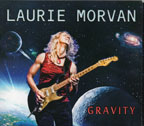 Laurie
Morvan
Laurie
Morvan
Gravity
Screaming Lizard Records www.LaurieMorvan.com
For the past twenty years Laurie Morvan has been showing off her talents
recording and attracting the attention of the blues community, making
it to the finals in the IBC with the Laurie Morvan Band and her band’s
CDs in 1997 and 2008. Her music came to a halt after a serious accident,
breaking her wrist put her playing on hold. Now ready to get back in the
game Laurie’s determined to do things her way. Ms Morvan’s
vocals are as smooth as cream but her lyrics express her personal blues,
honest and sometimes painful, she’s written all twelve tracks on
“Gravity.” With the support of producer and drummer Tony Braunagel
they are joined by Bob Glaub on bass, Mike Finnigan on B3 organ with Jim
Pugh and Barry Goldberg on additional organ and piano while Lisa Morvan,
Maxayn Lewis, Leslie Smith, Kudisan Kia and Ricky Nelson help with backing
vocals, Laurie is ready to shake things up her way.
Leading off with punchy Stevie Ray-like licks on “My Moderation,”
her vocals strong yet
calm, moderating between her strong playing and her feminine attitude.
Then with a sultry sway Laurie leads the band into an intense tale of
“Twice The Trouble,” agonizing over investing her heart in
financial terms with little return. With an upbeat bounce Laurie contends
someone’s dodging the issues on “Money Talks” as she
asks for a little help as the guitar does a little side stepping against
piano. The guitar wails like “Double Trouble” as Laurie forlornly
pleads “Stay With Me,” dragging a heavy pace and metallic
guitar, giving way to thought-provoking lyrics clarifying it’s not
easy but well worth going “The Extra Mile.” The light wispy
air of “Gravity” conceals some heavy truths that Laurie lays
down while some slippery guitar and a pounding beat weathers the storm
of “Dance In The Rain.” The ring of B3 and the chorus of backing
singers gives a gospel feel to “The Man Who Left Me” while
Laurie sings of the pain of abandonment but her guitar grinds in as she
cries “when life gets hard” you “Gotta Dig Deep.”
The pounding piano punctuates the heavy rhythm as she demands “I
Want Answers” her guitar slashing and burning in contradiction to
her calm plea. Then shifting to a lazy bounce with a hard edge of slide
guitar she calmly croons that she’s tough as nails and “Too
Dumb To Quit.”
Laurie Morvan is a heavily grounded guitarist but with her “Gravity”
it’s her vocals that take flight.—Roger & Margaret White
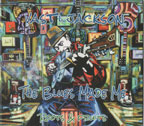 Vasti
Jackson
Vasti
Jackson
The Blues Made Me
Vast-Eye Music 2017
Multi-talented Mississippi bluesman Vasti Jackson received a Grammy nomination
- not his first - in December 2016 for his previous release, “The
Soul of Jimmie Rodgers,” a tribute to the confluence of blues and
country music. Jackson is still on a roll with this latest release, in
which he returns to a long-time theme of his, “roots and fruits.”
Several motifs recur in the ten tracks composed by Jackson. One of them
is unity, prominent in the opener, “Brother’s Keeper,”
a hypnotic, gospel-like five minute outing featuring just Vasti’s
voice and guitar. The motif is repeated in “The Blues Don’t
Discriminate,” the only track of the set that was recorded live.
The diminished live sound quality is redeemed by spare instrumentation
and Jackson’s effective delivery of the uplifting lyrics; the audience
at the Delta Theatre in Clarksdale, MS, was appropriately appreciative.
Certainly another crowd pleaser - I’ve seen him perform it - is
“My Computer Turned on Me,” performed with only acoustic guitar
which allows full exposure of Vasti’s sense of humor and facility
with words. It’s followed immediately by “No Payday Friday,”
a slow lament deploying Jackson’s appealing tenor vocal and piquant
electric guitar leads in tandem with equally piquant tinkly piano. (Notable
New Orleans keyboardist Joe Krown and Jackson are both cited as pianists
in the liner notes, but not specified on individual cuts.) This is one
of the best of many fine compositions on the album.
Another highlight is the title tune, again displaying Jackson’s
deftness on guitar, and returning to the theme of shared humanity and
the power of art to liberate. It aptly follows “Momma,” a
gentle encomium to Vasti’s mother. Definitely also worthy of mention
is “When the Night Comes,” with its impassioned vocal and
more excellent guitar work. The set closes with “Juke Joint Jump,”
which is just what the title implies, complete with accompanying hand
claps.
A final comment on the one cover track, of Muddy Waters’ “Rollin’
and Tumblin’ “: you may have heard many versions by many artists,
but this rendition is a tour de force visiting jazz, funk, soul, and African
tropes. I think that Muddy might have liked it; I sure did.—Steve
Daniels
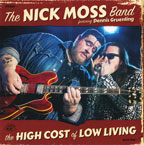 The
Nick Moss Band featuring Dennis Gruenling
The
Nick Moss Band featuring Dennis Gruenling
The High Cost of Low Living
Alligator 2018
Oh, man, set the awards aside for this album: it’s going to win
a few!
After gigs as sideman with Jimmy “Fast Fingers” Dawkins, Jimmy
Rogers, and Willie “Big Eyes” Smith, Moss formed his own band
and for almost twenty years has been evoking rave reviews on the way to
garnering twenty-one Blues Music Award nods. An adventuresome musician,
Moss has delved successfully into rock and Americana. Here he is back
to his Chicago roots, corralled by the noted Alligator label, and with
the addition of harmonica maven Gruenling, it’s a match made in
blues heaven.
The basic band of the last three years is intact: Patrick Seals on drums,
Nick Fane on bass, and Taylor Streiff on piano. Erstwhile second guitarist,
the powerfully dynamic singer Michael Ledbetter, has departed, but Moss’
incandescent guitar playing more than compensates, and his singing - Gruenling
handles the vocals on his own two compositions - is more than adequate.
These guys mesh like a beautifully oiled machine! They are aided on a
few tracks by former Robert Cray keyboard player Jim Pugh, guitarist and
producer Kid Andersen, and the saxophone duo of Eric Spaulding and Jack
Sanford.
Best Chicago blues bands of recent years? In my opinion: Magic Slim, now
sadly deceased, and the Teardrops; Lil’ Ed and the Blues Imperials;
Cash Box Kings. The Nick Moss Band is definitely in that list, and this
album confirms it: it cooks! From start to finish, this is boisterous,
blazing, barrelhouse urban twelve bar bliss.
I can’t even choose a few favorite tracks; they are all terrific.
Moss’ guitar introduces the opening number, “Crazy Mixed Up
Baby,” and never lets up. Gruenling shines at every opportunity,
justifying his Blues Music Award nomination as 2018 Harmonica Player of
the Year. Fane and Seals provide incessant drive, and Streiff alternately
cajoles and assails the ivories, especially on “He Walked with Giants,”
an ode to the late pianist Barrelhouse Chuck, former Chicago musical colleague
of Moss’. The instrumental “All Night Diner” gives the
principals sequential dazzling solos, Pugh’s organ included, and
Moss’ guitar takes the spotlight on the set closer, “Rambling
on My Mind.”
Top-notch album from a Blues Music Award nominee as 2018 band of the year.
Do not be surprised if they win.—Steve Daniels
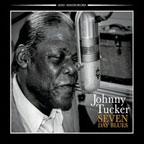 Johnny
Tucker
Johnny
Tucker
Seven Day Blues
High John CD 007
As very brief liners on the back cover of this release attest: “Though
this album was recorded in a series of 2017 sessions, it is a throwback
to the old-school approach. Johnny Tucker’s powerful vocals were
formed and stylized during that time period” and are spotlighted
here by engineer/producer/guitarist Big Jon Atkinson’s vintage vision
of a Sun Studio, neo-retro recording sound. In addition to Atkinson, swaggering,
bravado-ridden vocalist Tucker is backed by a few compadres that add zip
and panache to affairs—Bob Corritore shares piercing harmonica duties
with otherwise bassist Troy Sandow throughout, while Bob Welch’s
organ-work with Kid Ramos’ rockabilly guitar enliven the jump blues
“Tell You All.” Stellar selections from the other fourteen
tracks, all Tucker originals, begin with the sinuous gambol of “I
Can’t Wait,” the honeyed soul of “Love And Appreciation
(To Georgia),” the fat-grooved title track and the dance floor-filling,
riffling shuffle of “Do-Right Man.” But, on the other hand,
what’s not to like here?—Gary von Tersch
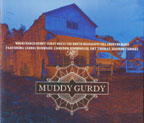 Hypnotic
Wheels and friends
Hypnotic
Wheels and friends
Muddy Gurdy
Vizztone 2018
It’s not often that something truly unique appears in the blues
world. Well, here you have it.
Those of us of a certain age remember the release exactly fifty years
ago of the album “Hurdy Gurdy Man” and its title song by popular
Scottish folk singer Donovan, with its unusual instrumentation. Was that
a moog synthesizer we were hearing, shortly after it was invented? Do
even we know what a hurdy-gurdy is? Well, it’s a hand-cranked string
instrument with drone strings that can sound like a guitar, a violin,
and a bagpipe. Created approximately a thousand years ago, it has maintained
a presence in Europe, particularly in France, and has developed its own
mythology. (For those interested in further hurdy-gurdy history, look
it up on the Internet and check out the article about it in The New York
Times of Feb. 27, 2018.) Recently, the hurdy-gurdy has been electrified
to augment its sound capabilities further.
So, Hypnotic Wheels, a trio comprised of guitar, percussion, and hurdy-gurdy,
traveled to the U.S. in spring 2017 to jam and record with some of the
scions of Mississippi hill country greats R.L. Burnside, Junior Kimbrough,
Otha Turner, and James Son Thomas. The attraction makes sense: the droning
character of the hurdy-gurdy evokes and emulates the minimally melodic,
droning, mesmerizing quality of much of hill country blues.
According to the liner notes, recording was informal, occurring on porches
and in living rooms, and indeed there is an appealing spontaneous quality.
The first four tracks feature Cedric Burnside, renowned as a drummer but
also an adept guitarist, as shown here. He and the French musicians dig
into three Burnside family tunes of varying tempo, Cedric providing the
lead guitar and vocals and Gilles Chabenat the hurdy-gurdy/second guitar;
they finish with a flourish with a cover of the Muddy Waters classic “Rollin’
and Tumblin’.”
Sharde Thomas, granddaughter of Otha Turner, takes the spotlight on the
next three numbers: one of Otha’s, then her own composition, then
a version of the traditional “Glory Glory Hallejulah.” Her
singing stimulates memories of the late great hill country blueswoman
Jessie Mae Hemphill and she plays the fife, a staple African American
instrument of the late 19th. and early 20th. centuries.
Cameron Kimbrough and Pat Thomas subsequently collaborate on two tracks
each; Cameron’s rendition of Junior Kimbrough’s “Leave
Her Alone” and Thomas’ ethereal “Dream” are especially
notable. The set ends with three Hypnotic Wheels covers, including a zesty
take on Mississippi Fred McDowell’s “Shake “Em on Down,”
with Tia Gouttebel adeptly handling both guitar and vocal.
If you like hill country blues and/or want to experience something out
of the ordinary, try “Muddy Gurdy”; you won’t be disappointed.—Steve
Daniels
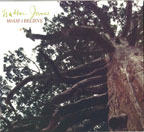 Nathan
James
Nathan
James
What I Believe
Sacred Cat Recordings 2017
A native and resident of San Diego County, CA, Nathan James has forged
a distinguished identity in the blues world. Belying his youthful appearance,
James has been a force for two decades, often playing incandescent lead
guitar in the band of one of his mentors, James Harman. Equally adept
with acoustic guitar, in 2007 he and erstwhile colleague Ben Hernandez
won the International Blues Challenge in the solo/duo category.
James has a restless creative spirit. Unable to decide between releasing
solo acoustic or band albums in 2014, he did both. He has devised his
own unique instrument, the Washtar Gitboard, a combination of guitar and
metallic rub-board.
In addition to covering tunes by such worthy progenitors as Blind Boy
Fuller, Earl King, and Curley Weaver, he is a prolific songwriter: all
eleven tracks of this album are originals. Oh, did I mention that he also
plays drums, fiddle, mandolin, bass, and piano in this set? (He also plays
rack harmonica on many of his solo gigs.)
After two opening mid-tempo shuffles, the release kicks into high gear
with “Is It Too Late,” sporting nifty backing vocals by a
female trio. The ensuing swinging back porch tune, “Give to Understand,”
has embellishment by ace harmonicat Kim Wilson, and another of the myriad
skilled guest contributors, Melissa Barrison, lends violin to “Down
on the Road,” James himself interspersing delicate piano filigree.
Percussionist Marty Dodson and bassist Troy Sandow of James’ band
The Rhythm Scratchers make frequent appearances, and Sandow provides the
harmonica licks on the title track, which also sports a tuba part. “Tryin’
to Get Along with Myself” delves into country territory, and “Silent
Treatment” is a propulsive twelve-bar excursion with Dodson and
Sandow. Mentor and harmonica adept James Harman participates in both “In
the News Today” and the penultimate cut, “Bonsai Sequoia,”
an instrumental highlighting Malachi Johnson on drums and Nathan vamping
on baritone guitar.
“When Tomorrow Comes,” with its devotional country flavor,
ends the set memorably with Nathan playing fiddle and harmonizing with
San Diego singer Missy Andersen. I for one won’t be waiting until
tomorrow to play this CD again.—Steve Daniels
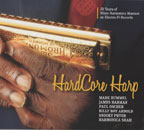 Various
Artists
Various
Artists
Hard Core Harp
Electro-Fi 2017
Founded in 1996, Toronto, Canada-based label Electro-Fi has specialized
in quality releases particularly featuring guitarists and harmonica mavens.
This twenty-year compendium delivers a solid hour-plus of gritty harp
tunes, primarily reprising urban, Chicago blues but also reaching into
the deep South genre. There’s plenty here to please any aficionado
of the “Mississippi saxophone.”
Opening the set is an instrumental dazzler by former Muddy Waters band
member Paul Oscher, showcasing his skill with a chromatic harp. Waters
alumnus George “Harmonica” Smith is subsequently featured
on two numbers, “Crazy “Bout You Baby” and “Juke.”
No, Smith did not record for Electro-Fi, obviously, since he died in 1983
at the cruelly young age of 59, but at the instigation of Mark Hummel,
the label resurrected sessions just prior to Smith’s death. The
former track is a slow blues with compelling singing as well as top-notch
harmonica, and the latter is the familiar instrumental classic penned
and made famous by Little Walter Jacobs. “Juke” is a challenge
for any harp aspirant, but Smith nails it…and amusingly introduces
it by claiming that he didn’t know Little Walter or any of his records!
Unlikely!
Hummel himself covers Little Walter, one of his most admired predecessors,
with “It’s Too Late Brother,” faithfully reproducing
Walter’s pristine tone and jaunty approach. The final track of the
CD is also Hummel’s: his own instrumental composition, “Harpoventilating.”
That tour de force will leave you dancing!
For variety, we have Canadian bluesman Harrison Kennedy in his only appearance,
with “Afraid to Fail,” an amalgam of Mississippi hill country
blues with Otis Taylor’s “trance blues.” Inheritance
of familial talent is revealed by two stellar tracks of the late, great
Snooky Pryor, “Rock-a-While” and “Headed South,”
and “Pitch a Boogie Woogie” by his son, contemporary Rip Lee
Pryor.
Other performers range from the familiar to the more obscure. Billy Boy
Arnold, in his 80’s but still going strong, is represented by three
tracks, and the late Sam Myers, stalwart for many years with Anson Funderburgh
and the Rockets, dishes it in “Coming from the Old School”
and the Sonny Boy Williamson II tune “Ninety Nine.” James
Harman presents the title cut from his lauded 2015 album “Bonetime,”
and the recently deceased drummer Willie “Big Eyes” Smith
shows that he was definitely no slouch on harmonica with his self-penned
“Don’t Think I’m Crazy.” Chicago’s Little
Mack Simmons, Detroit’s Harmonica Shah, and Canada’s Al Lerman
are less recognized but their tracks prove that they can blow with the
best.
Aside from my discomfort with the misogynistic lyrics of a couple of songs
- not just now, but never has it been acceptable to threaten to “shoot
my baby” if she leaves - I have nothing but praise for this collection
of harpmeister gems.—Steve Daniels
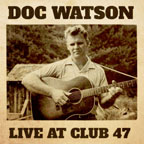 Doc
Watson
Doc
Watson
Live At Club 47
Yep Roc CD
Born in rural Deep Gap, North Carolina in the heart of the Blue Ridge
Mountains in 1923, Doc Watson was a celebrated fingerpicking guitarist,
song writer and singer of bluegrass, country, folk, blues and gospel music.
Recorded 55 years ago at the legendary Club 47 in Cambridge, MA, this
never-before heard two-set concert features four never-recorded selections
from his early repertory (including “Old Dan Tucker” and the
lively “Hop High Ladies The Cake’s All Dough”) alongside
conversation-laden, vigorous performances of some of Watson’s favorite
songs from the likes of the Carter Family, Charlie Poole (“Don’t
Let Your Deal Go Down”), Frank Hutchison, the Mississippi Sheiks
(“Sitting On Top Of The World”), Merle Travis (“Blue
Smoke”) and Uncle Dave Macon. Joining Doc on a couple of tracks
are mandolinist Ralph Rinzler and second guitarist John Herald—their
team-ups on the traditional titles “Way Downtown” and the
Holiness Church number “Somebody Touched Me” are exemplary.
Shortly after this performance, Watson was booked at the mythic 1963 Newport
Folk Festival, released his debut album on Vanguard Records to wide acclaim
and went on to become America’s preeminent folk guitarist earning,
count ‘em, seven Grammy Awards along the way. Not bad for a blind
country boy who learned how to play music by listening to 78’s on
the family phonograph.—Gary von Tersch
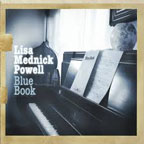 Lisa
Mednick Powell
Lisa
Mednick Powell
Blue Book
Self-Produced CD
Folk/Country/Blues Singer-Songwriter and multi-Instrumentalist, Lisa Mednick
Powell, recently released her third project—her first in 16 years.
Composed of ten intriguingly well-crafted, impressionistic songs (think
Lucinda Williams) that veer from the finger-pointing “Give The Guns
To The Girls,” that is at the harrowing intersection of not only
feminism but both American as well as global political radicalism and
the leadoff number “Smoke Over Carolina” (the third in a trilogy
of Civil War-related songs and as haunting and well crafted as her earlier
gems “Harper’s Ferry” and “Chickamauga”)
to the reflective, somberly pensive title tune where she’s “trying
to erase a line” in her “Blue Book”—Powell is
at the top of her game. Recorded in the California High Desert as well
as in New Orleans and Los Angeles with her bass-playing/co-composing husband
Kip Powell and a handful of pals including the fore-mentioned Williams,
Tommy Malone, Alison Young and Greg Leisz, producer Powell weaves a opulently
resonant crazy quilt of often fervidly perplexing songs that inevitably
recall the gossameriness of life. Other picks encompass the downbeat “Pieces
Of Your Soul,” a memory-laden “Cold Coffee,” a Band-like
“To The Wilderness” and the driftingly melodic closer “Highway
Prayer. Worth the search.—Gary von Tersch
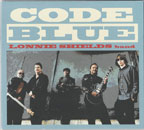 Lonnie
Shields
Lonnie
Shields
Code Blue
New Millenium Records 2017
Horn-driven soul blues is represented in this latest release by Lonnie
Shields. Originally from West Helena, Arkansas, Shields morphed from being
a funk musician after being imbued with the blues by his mentor, drummer
Sam Carr of the great and gritty Delta blues band the Jelly Roll Kings.
Shields subsequently played with the Kings, also comprised of Frank Frost
and Big Jack Johnson. In 1993 his debut album, “Portrait,”
won the Critics’ Poll of Living Blues magazine as best blues album
of the year. Shields now wields his ax from his adopted home near Philadelphia,
Pennsylvania, and continues to tour and record.
Support here is ably provided by Jesse Loewy on guitar, Mike Whren on
bass, Steve Hoke on keyboards and saxophone, and Neil Simpkins on percussion.
The expected and worthy focus, of course, is Shields, whose guitar leads
and tenor vocals are consistently tasteful. (I presume that Shields is
playing most of the guitar leads, rather than Loewy; liner notes don’t
specify.) Album producer Mitch Hunter also grabs some time, and special
kudos are warranted for the outstanding contributions of Don Collins (trombone),
Louis Taylor (saxophones), and Henri McMillian (trumpet), who furnish
bristling brass backing throughout.
A track by B.B. King, who Shields cites as one of his major influences,
“Never Make Your Move Too Soon,” is an example of the intricate
meshing of this band’s elements. The tune opens with a wailing horn
section introduction, followed by a rhythmic groove established by the
steady bass and syncopated drums, and succeeded later by some snazzy horn
solos. B.B.’s influence recurs with a cover version of “The
Thrill Is Gone,” not written by King but made famous by him. King’s
superb delivery isn’t quite equaled here (who can sing like King
could?), but the rendition is more than credible. King’s single
note guitar style is emulated successfully in the longest track of the
hour-long set, the title tune, “Code Blue,” with vocal courtesy
of Gary White.
Of the five (of thirteen) numbers written or co-written by Shields, I
particularly like “Empty Pocket Man” and “Hard Headed
Woman.” The former, the initial track, again establishes a groove
and has nice solos by both principal guitarists. The latter song (not
the 1958 Elvis Presley rocker of the same name) has another nifty guitar
solo at mid-point, augmented by Taylor on baritone sax. Shields even ventures
into slow soul blues territory with a nervy cover of “How Can You
Mend a Broken Heart?” by Barry and Robin Gibb; his slightly raspy
vocal gives an interesting contrast with the smooth vocals of many soul
singers.—Steve Daniels
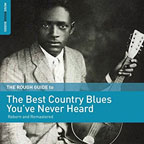 Various
Artists
Various
Artists
Rough Guide To The Best Country Blues You’ve Never Heard
Rough Guide CD 1362
Conundrums abound for most of the enigmatic, colorfully nicknamed country
blues musicians who cut just a sprinkling of sides in the 1920s and 1930s.
Also known as folk, downhome or backwoods blues, country blues is incontestably
acoustic, mainly guitar-galvanized and mixes elements of the rural blues
with aspects of country and western and folk music. Notable examples abound
on this great-sounding, jam-packed 25 tracker—John Byrd and Washboard
Walter’s “Wasn’t It Sad About Lemon” is a testimonial
to the prolific Texas bluesman Blind Lemon Jefferson issued shortly after
his death. Similarly, The Two Poor Boys pay their respects with “Two
White Horses In A Line,” a vivid adaptation of Lemon’s “See
That My Grave Is Kept Clean,” complete with some hillbilly mandolin.
Frequent accompanist Charlie McCoy also was a mandolinist and displays
his versatility with the overwrought “Always In Love With You.”
On the distaff, blues-diva side, compelling vocalist Lottie Kimbrough
teams up with bird caller and yodeler (talk about country) Winston Holmes
on the crestfallen “Lost Lover Blues” while Mississippi Matilda,
with her suspenseful falsetto, puts the point across on “Hard Working
Woman” and Pearl Dickson pays tribute to her “Twelve Pound
Daddy,” one of only four sides she cut in 1927. Also noted is “Honey
Blues” by Texas guitarist “Funny Papa” Smith (the original
Howlin’ Wolf), a great revision of “Kansas City Blues”
entitled “Goin’ Up The Country” (Canned Heat anyone?)
by the prematurely bald Papa Egg Shell and Walter Coleman’s great
reworking of Reverend Gary Davis’ “Mama Let Me Lay It On You.”—Gary
von Tersch
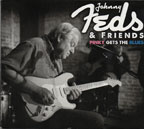 Johnny
Feds & Friends
Johnny
Feds & Friends
Pinky Gets The Blues
Elfedmo Music jpfstrat3@aol.com
facebook.com/Johnny Feds & Da Bluez Boys
When I first put on Johnny Feds & Friends’ CD “Pinky Gets
The Blues” The thing that got me was the sound: a warmth and clarity
with an easy ringing tone. But I wondered, ‘who is Johnny Feds?’
The cover showed a middle-aged man on guitar, I didn’t recognize
any other players and only one song was familiar. I started checking online,
couldn’t find much, a few YouTube videos and a Facebook page. But
listening it hit me, it’s just honest music. A long time player,
not putting anything on, playing what he feels and writing about what
he knows. It’s self produced, recorded in his bass player’s
garage studio and at a local club in Piermont, New York. These ain’t
no superstars but you can feel what they’re playing, it’s
real. Johnny’s Friends are John Elmo Lawson on bass, Paul Undersinger,
Jeremy Driesen or Kirk Devereux on drums, Fred Lind and Chris Burke on
keyboards with vocals split between Johnny, Tom Blues Buddha Dudley, JP
Patrick and Michael Rev Rochelle.
The first set, featuring Tom Dudley on vocals as the guitar kicks in with
a ringing tone and blistering lines like Roy Buchanan on “Deacon
Of The Blues” then adding organ he takes his Stratocaster into Albert
Collins territory with his “Axe To Grind,” slipping on a slide
for “Redemption” that reminds me of Savoy Brown. Switching
singers to JP Patrick, the band mimics distant bagpipes and military drums
as the lyrics bring in his family saying “he won’t be home
for Christmas” from “Faraway Land” as the sounds of
war echo in the back. Bringing this to a sad conclusion with a distant
cry of guitar “Jamie’s Song: Son Goes Down” using haunting
echoes like Robin Trower and tumbling lines like bitter tears. Later they
return to “Jamie’s Song: Son Goes Down” (Revisited)
with Michael Rochelle on vocals playing harder and faster as the anger
builds, then easing back over piano backing on the “Fragile Heart”
he sings “be a good man to your woman cause your woman loves her
man” as the band swells behind. Johnny Feds steps to the mic himself
to sing, late at night to his wife, “Pinky Gets The Blues,”
the organ flourishes as Feds’ solo ranges between Stevie Ray and
Roy Buchanan. Taking it from that bedroom to live at the Turning Point
Johnny makes “I’ll Play The Blues For You” his own,
mixing the sound of “Fried Neck Bones” with his blistering
solos.
Johnny Feds & Friends plays straight from the heart and you can tell
“Pinky Gets The Blues” is real.—Roger & Margaret
White
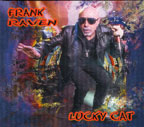 Frank
Raven
Frank
Raven
Lucky Cat
www.frankravenmusic.com
Frank Raven grew up on Chicago’s Northwest side during the ‘60s
experiencing live blues like Junior Wells and Paul Butterfield. Inspired
by his heroes he picked up the harp at age sixteen and joined his first
band. Throughout his forty year career Raven has been involved in a variety
of bands often working six nights a week touring the club circuit or playing
gigs alongside an impressive list of contemporary artists. In recent years
he’d been playing with the Lucky 3 Blues Band but misfortune struck
and a member of the trio was forced to retire. After much soul searching
Raven found he’d accumulated a collection of songs revolving around
a central theme of good or bad luck and realized he had the makings of
a great blues album. Raven has teamed up with guitarist, producer and
engineer Jay O’Rourke and guitarist Lee D’Budda but it’s
Frank’s crisp brassy sound from his customized Joe Filisko harmonicas
and his lyrics that gives “Lucky Cat” it’s charm.
Frank Raven feels he is that “Lucky Cat” with it’s lighthearted
pace and bouncing harp till that upbeat spell is broken by the piercing
harp riff of “Mr. Blues” as Raven pleads that he’s here
to make amends while a pair of sharp guitars scream in response to punctuate
this blues. The pace picks up with a jerky Bo Diddley rhythm as he stumbled
into a state of “Blues Confusion,” the harp drones and warbles
as Raven realizes “The Jinx Is On Me.” A slow blues harp wails
through Frank’s mournful cries of “I Wake Up Screamin’”
while the gentle moans of guitar reverberate between verses the nervous
pace builds as Frank sings “Poor Me” he’s got troubles
he can’t see and is in a world of misery while a roaring harp emphasises
the lyrics. Changing tempo Frank realizes this boy needs to get back to
the city for some “Bloody Williamson Blues” and they slip
in some slide guitar as Raven warns stay on track and “Don’t
Look Back.” Rebounding into an upbeat track with some light fluttering
harp and everyone singing backup Raven declares “My Luck Done Changed”
as the band struts with an air of confidence. The final track is an instrumental
that shows how tight the band is while stretching out with some tasty
licks on “Sweet Tooth.”
The blues is a personal journey that Frank Raven has traveled through,
with passion and perseverance he’s proven he is a “Lucky Cat.”—Roger
& Margaret White
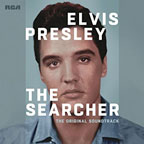 Elvis
Presley
Elvis
Presley
The Searcher (The Original Soundtrack)
Sony/Legacy/RCA 3-CD Box Set
This 3CD “deluxe” box set is the musical complement to the
HBO two-part documentary directed by Grammy award winner Thom Zimmy, who
explains that, “the soundtrack was in my mind from the beginning.
I wasn’t just making a film, I was thinking about the collection
of recordings I would gather for a person who saw the film, who wanted
to complete the experience—just as I had after seeing musical documentaries
like The Last Waltz or Gimme Shelter. To me this collection is part of
the film.” Disc one features 28 essential Presley hits, riveting
performances and rare alternative versions of songs at the core of his
mesmerizing genius—curios include a cover of “Tweedlee Dee,”
recorded in April, 1955 at Texas’ Gladewater High School, a version
of the Clovers’ “Fool, Fool, Fool” recorded the same
year at radio station KDAV in Lubbock, Texas and a recall of “Mona
Lisa” recorded at his home in Goethestrasse, Bad Nauheim, Germany.
An additional 27 Zimmy picks comprise the second disc—rarities here
encompass a duet with Frank Sinatra on “Love Me Tender/Witchcraft,”
rehearsal renditions of “Baby Let’s Play House,” “Burning
Love” and Separate Ways” and take 6 of “Suspicious Minds.”
The third disc not only features selections from Pearl Jam’s Mike
McCready’s original score for the documentary but Tom Petty and
his Heartbreakers performing “Wooden Heart” a bunch of rhythm
‘n’ blues and country classics that inspired the Hillbilly
Cat and “Home Sweet Home” sung by his mother. This five-star
project also includes a forty page hardcover book with an abundance of
rare images and informative liners by Warren Zanes. As the late Tom Petty
puts it in the documentary: “You know, God bless him. He was a light
for all of us. We all owe him for being the first going into battle. He
had no road map and he forged a path of what to do and what not to do.
And we shouldn’t make the mistake of writing off a great artist
because of all the clatter that came later.” Amen.—Gary von
Tersch
Home
/ Blues Blogs /
Artist Links / Blues
Links / Videos / Store
Subscribe / Advertise
/ Back Issues
/ Contact / Staff